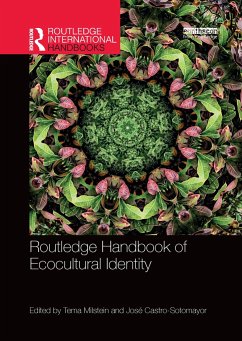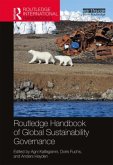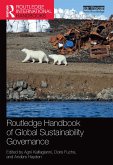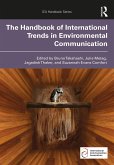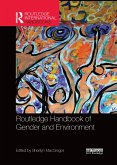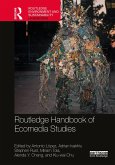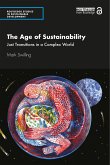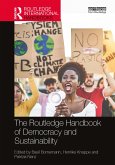The Routledge Handbook of Ecocultural Identity brings the ecological turn to sociocultural understandings of self. The editors introduce a broad, insightful assembly of original theory and research on planetary positionalities in flux in the Anthropocene - or what in this Handbook cultural ecologist David Abram presciently renames the Humilocene, a new "epoch of humility." Forty international authors craft a kaleidoscopic lens, focusing on the following key interdisciplinary inquiries:
Part I illuminates identity as always ecocultural, expanding dominant understandings of who we are and how our ways of identifying engender earthly outcomes.
Part II examines ways ecocultural identities are fostered and how difference and spaces of interaction can be sources of environmental conviviality.
Part III illustrates consequential ways the media sphere informs, challenges, and amplifies particular ecocultural identities.
Part IV delves into the constitutive power of ecocultural identities and illuminates ways ecological forces shape the political sphere.
Part V demonstrates multiple and unspooling ways in which ecocultural identities can evolve and transform to recall ways forward to reciprocal surviving and thriving.
The Routledge Handbook of Ecocultural Identity provides an essential resource for scholars, teachers, students, protectors, and practitioners interested in ecological and sociocultural regeneration.
The Routledge Handbook of Ecocultural Identity has been awarded the 2020 Book Award from the National Communication Association's (USA) Environmental Communication Division.
Part I illuminates identity as always ecocultural, expanding dominant understandings of who we are and how our ways of identifying engender earthly outcomes.
Part II examines ways ecocultural identities are fostered and how difference and spaces of interaction can be sources of environmental conviviality.
Part III illustrates consequential ways the media sphere informs, challenges, and amplifies particular ecocultural identities.
Part IV delves into the constitutive power of ecocultural identities and illuminates ways ecological forces shape the political sphere.
Part V demonstrates multiple and unspooling ways in which ecocultural identities can evolve and transform to recall ways forward to reciprocal surviving and thriving.
The Routledge Handbook of Ecocultural Identity provides an essential resource for scholars, teachers, students, protectors, and practitioners interested in ecological and sociocultural regeneration.
The Routledge Handbook of Ecocultural Identity has been awarded the 2020 Book Award from the National Communication Association's (USA) Environmental Communication Division.
"Intricately transdisciplinary and cross-geographical, it is the first volume of its kind to caringly craft a gathering concept, that of ecocultural identities, bringing together the social, political, and ecological dimensions of identity. What results is a treasure of insights on the politics of life, broadly speaking, and a novel toolbox for tackling effectively the damages caused by modern capitalist modes of extraction and the urgent task of Earth's ontological repair and renewal."
Arturo Escobar, University of North Carolina, Chapel Hill
"Too often mislabelled an 'issue,' the environment is in fact integral not just to everything we do but to who we are. This link between our identity and our ecology has long been recognised in many societies, but others seem to have forgotten its signal importance. This superb collection shows why all identities are ecocultural ones, and why full recognition of this is essential to all our political futures."
Noel Castree, University of Manchester
"A smart, provocative, and original collection, the Handbook of Ecocultural Identity provides a definitive introduction to the constraints upon, and the contexts, formations, and impacts of, our diverse - but often unexamined - ecological selves."
Robert Cox, University of North Carolina, Chapel Hill, and three-time national president of the Sierra Club
"The Handbook of Ecocultural Identity is an urgent call to the prevailing identity discussion. Amplifying the voiceless could - and should - encompass our environment, and not just the humans in it. If we can't recognise the value of the ecosystem which makes life possible, there's slim chance we'll remember to see the value in each other."
Ayishat Akanbi, cultural commentator and writer, United Kingdom
"If diversity is a crucial condition for healthy cultural and ecological affairs, it is also so in scholarly matters, and that is what readers will find in this excellent Handbook - a variety of ways of keeping our social and ecological worlds mutually articulated, healthily together."
Donal Carbaugh, University of Massachusetts
"I am in complete solidarity with this book."
Donna Haraway, University of California, Santa Cruz
"Some of the most transformative scholarship occurs when we don't simply critique the limits of existing approaches, but courageously throw in front of us new conceptual approaches or orientations, often marked in the first instance by new words. It is in this vein that the Handbook of Ecocultural Identity runs, offering up and then beginning to give form, colour, and texture to the term "ecocultural identity" as a way to think beyond a range of dichotomies that have constituted and normalized human exceptionalism and our violent estrangement from the eco-worlds in which we are embedded. In a spirit of humility and generosity, the editors do not try to fix this new term in the net of their own interpretations, but rather create a rich interdisciplinary and global forum where the chapter authors are welcomed to articulate their understandings of what ecocultural identity means, and what this term might do to how we might think and act. Readers too are invited to join the conversation in what promises to be a fertile approach to thinking and acting with appropriate humility in an era that is crying out for humans to come home to themselves as ecocultural beings."
Danielle Celermajer, University of Sydney
"The chapters in this Handbook lay the groundwork for a radical revisioning of human relations with/in the more-than-human world. The Handbook provides needed strategies for ecological resilience in the midst of the Anthropocene and for imagining our collective future."
Danielle Endres, University of Utah
"As we find ourselves faced with the extreme environmental consequences of the Anthropocene, we need guides to help us negotiate appropriate ways of living with and understanding our relationship to the more-than-human world. This Handbook offers to the field a significant theoretical contribution, ecocultural identity, providing a practical and necessary guide for comprehending our inseparable place in the ecological web of life."
Barb Willard, DePaul University
Arturo Escobar, University of North Carolina, Chapel Hill
"Too often mislabelled an 'issue,' the environment is in fact integral not just to everything we do but to who we are. This link between our identity and our ecology has long been recognised in many societies, but others seem to have forgotten its signal importance. This superb collection shows why all identities are ecocultural ones, and why full recognition of this is essential to all our political futures."
Noel Castree, University of Manchester
"A smart, provocative, and original collection, the Handbook of Ecocultural Identity provides a definitive introduction to the constraints upon, and the contexts, formations, and impacts of, our diverse - but often unexamined - ecological selves."
Robert Cox, University of North Carolina, Chapel Hill, and three-time national president of the Sierra Club
"The Handbook of Ecocultural Identity is an urgent call to the prevailing identity discussion. Amplifying the voiceless could - and should - encompass our environment, and not just the humans in it. If we can't recognise the value of the ecosystem which makes life possible, there's slim chance we'll remember to see the value in each other."
Ayishat Akanbi, cultural commentator and writer, United Kingdom
"If diversity is a crucial condition for healthy cultural and ecological affairs, it is also so in scholarly matters, and that is what readers will find in this excellent Handbook - a variety of ways of keeping our social and ecological worlds mutually articulated, healthily together."
Donal Carbaugh, University of Massachusetts
"I am in complete solidarity with this book."
Donna Haraway, University of California, Santa Cruz
"Some of the most transformative scholarship occurs when we don't simply critique the limits of existing approaches, but courageously throw in front of us new conceptual approaches or orientations, often marked in the first instance by new words. It is in this vein that the Handbook of Ecocultural Identity runs, offering up and then beginning to give form, colour, and texture to the term "ecocultural identity" as a way to think beyond a range of dichotomies that have constituted and normalized human exceptionalism and our violent estrangement from the eco-worlds in which we are embedded. In a spirit of humility and generosity, the editors do not try to fix this new term in the net of their own interpretations, but rather create a rich interdisciplinary and global forum where the chapter authors are welcomed to articulate their understandings of what ecocultural identity means, and what this term might do to how we might think and act. Readers too are invited to join the conversation in what promises to be a fertile approach to thinking and acting with appropriate humility in an era that is crying out for humans to come home to themselves as ecocultural beings."
Danielle Celermajer, University of Sydney
"The chapters in this Handbook lay the groundwork for a radical revisioning of human relations with/in the more-than-human world. The Handbook provides needed strategies for ecological resilience in the midst of the Anthropocene and for imagining our collective future."
Danielle Endres, University of Utah
"As we find ourselves faced with the extreme environmental consequences of the Anthropocene, we need guides to help us negotiate appropriate ways of living with and understanding our relationship to the more-than-human world. This Handbook offers to the field a significant theoretical contribution, ecocultural identity, providing a practical and necessary guide for comprehending our inseparable place in the ecological web of life."
Barb Willard, DePaul University

